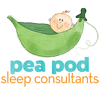Everything Gets Blamed on Teething!
Teething gets a bad rap! Teething takes the blame for just about everything, including disrupted sleep. A lot of parents say their child has been teething FOREVER. And, many parents feel that teething is surely the reason their little one isn’t sleeping well. We’ve broken down just about everything you need to know about teething- including separating teething facts from teething fiction.
What is teething?
Teething is the process of tooth eruption through the gums.
When does teething start and how long does it last?
Although the first tooth may show up by three months, most babies start teething around six month. Before they’re three-years-old, most toddlers have a complete set of deciduous (baby) teeth.
What does teething look like?
- Drooling
- Chewing on just about anything and everything!
- Discomfort
- Fussiness, irritability
What may happen because of teething?
- Mild rash or skin irritation around the mouth due to excessive drooling
- Night time restlessness due to discomfort
- Refusal of solid foods due to gum irritation
- Hands rubbing cheeks due to gum discomfort
- Mildly elevated temperature (<100.4 degrees)
Will this last forever?
It may feel like it, but no. Teething discomfort usually lasts up to three days. After one tooth shows up, the discomfort generally gets better until the next tooth comes in. Teething does not last more than two years without any breaks!
When you’re going through it, here are some ways you can help your teething baby feel better:
- Offer something cold – Freeze a wet wash cloth and let your baby suck on it. Gel teethers work better in the refrigerator than the freezer! They’re too hard frozen.
- Provide chew toys – There are all sorts of chew toys! There’s Sophie the Giraffe, the Banana Teether, the Nuby IcyBite Teether, the Comotomo Teether and a whole slew of others. If you’re worried about plastic toys, look for silicone or BPA-free options.
- Do a little finger massage – wash your hands and gently rub your finger or knuckle over your baby’s sore gums.
If you’ve tried all of the above and your baby really seems uncomfortable, can you offer medication for your baby’s discomfort?
“Most kids don’t need pain medication for teething,” said Dr. Marsho, a pediatrician at Tosa Pediatrics in Wauwatosa. “Frequently, just chewing on a frozen mini-bagel will relieve a child’s discomfort. If a child experiences a lot of pain in the midst of a tooth eruption, acetaminophen (Tylenol) and Ibuprofen (Advil/Motrin) can help relieve the pain,” he said. Dr. Marsho says parents should only give Ibuprofen to babies older than six months. After that, he advises on an empty stomach, Ibuprofen can be tough on the tummy.
You’ve undoubtedly heard that teething gels can help. What about those?
According to Dr. Marsho, “In the last few years, teething gels have not been recommended by pediatricians. Younger infants run the risk of numbing their tongue or the back of their throat. This can inhibit swallowing and increases the risk of choking,” he said. He adds the ingredient in most teething gels can cause a blood disorder. “Finally, with all of the drooling that kids do, most gels get washed away very quickly, anyway!” he said.
You may have seen a lot of kids with teething necklaces and beads. Do they help?
They are not safe, nor are they effective. Retailers may claim that certain kinds have anti-inflammatory or analgesic effects but the evidenced based research does support that. The risk of choking and strangulation is just too high. Bottom line: don’t use these to address teething discomfort!
If your baby or toddler isn’t sleeping well, can teething be the reason?
There are lots of reasons why sleep can be disrupted. If your child is working on a developmental milestone (sitting, crawling, standing, walking), it’s very normal to experience a sleep setback. While your baby practices these new skills, sleep can be “off” for a short time. Your formerly great sleeper might have a week of rough nights. It’s temporary! Just stick to your routines and good sleep hygiene and your great sleeper will surface again!
If your baby isn’t working on a milestone or isn’t waking at regular intervals, a random waking could be because of teething.
But, if your baby wakes every few hours and won’t go back to sleep until you intervene it’s not the teeth! It’s likely a sign you baby has a sleep association– something they need to fall asleep- that doesn’t allow them to sleep all night. If you’re rocking, bouncing or feeding your baby to sleep, your baby is waking up at the end of one or two sleep cycles and wants you to repeat the rocking, bouncing or feeding in order to get back to sleep. This cyclical waking has nothing to do with teething. It’s time to end the unsustainable sleep associations and turn the process of self-soothing over to your baby or toddler.
Lastly, know what teething is NOT associated with. Teething does not cause:
- Temperature > 100.4
- Diarrhea
- Runny nose, cough or congestion
- Body rash
- Vomiting
If your child exhibits any or all of these symptoms, please don’t ignore them. They’re not due to teething. It’s time to talk to your pediatrician!
